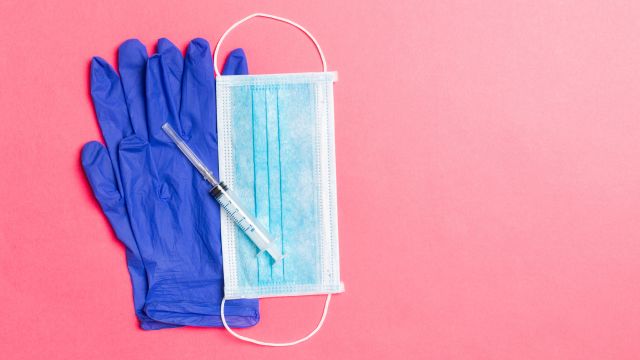Anyone who has ever had chickenpox is at risk for shingles. Both conditions are caused by the varicella-zoster virus. After a bout of chickenpox resolves, this virus remains in the body in a dormant state, taking up residence in nerve tissues. Years later, the virus can reactivate and cause shingles. It’s estimated that one in three people will experience shingles during their lifetime.
Shingles causes a red, blistering, painful rash that often appears in a strip on one side of the torso—though it can also occur on the face, neck, and around the eyes. The pain can be intense. People may also experience itching, burning, tingling, and numbness. Between 10 and 18 percent of people with shingles experience a complication called postherpetic neuralgia, or PHN, nerve pain that lasts for months or even years.
Fortunately, there is a vaccine that can protect you against shingles, and you can get this vaccine at most pharmacies. Getting vaccinated at a pharmacy can be helpful to people who may want to avoid medical offices during the coronavirus pandemic.
Preventive care is important
The coronavirus pandemic has impacted the healthcare system in a number of ways. One of those ways is a decrease in the number of people who are using—or who are able to use—preventive care. Preventive care refers to routine checkups, screenings, vaccinations, and other healthcare services that focus on preventing disease or monitoring your overall health.
Vaccinations are an important part of preventive care for people of all ages. During the pandemic, the Centers for Disease Control and Prevention (CDC) recommends following the vaccination guidelines as closely as possible. For adults over the age of 50, this includes getting the shingles vaccine.
The CDC's recommendation
As with taking any vaccination or medication, people are advised to speak to their healthcare provider beforehand. The shingles vaccine is approved for adults 50 years or older. It may be given to people who have received an older version of the shingles vaccine because it may offer better protection. It may also be given to people who have had shingles in the past because it can prevent a person from getting shingles again. The vaccine is 90 percent effective at preventing shingles and long-term nerve pain.
Getting vaccinated at your pharmacy
The process of getting your shingles vaccine at your local pharmacy is pretty straightforward. It will require an appointment, which can be booked online or over the phone. The vaccine is administered as a shot, typically in the upper arm.
Here are some tips for booking your appointment and getting the shingles vaccine:
- If you have questions about your vaccination status, what vaccines you need, or the potential for adverse reactions to a vaccine, contact your healthcare provider before booking your appointment.
- Before booking your appointment, check your insurance plan to see if the vaccine is covered. Coverage may depend on your age and your coverage plan and may incur an out-of-pocket payment. Your coverage plan may also require a prescription from a healthcare provider in order to get the vaccine.
- When choosing a pharmacy, ask about the availability of the shingles vaccine. This vaccine is in high demand and there are periodic shortages.
- Make your appointment to receive your second dose of the shingles vaccine. The shingles vaccine requires two doses. For the newer vaccine that is preferred by the CDC, the second dose is given between 2 and 6 months after the initial dose.
- To avoid crowds, you may want to check online to see when the pharmacy’s busiest hours tend to be, and then book your appointment during a time when there will be fewer customers in the store.
- The shingles vaccine can be given at the same time as certain other vaccines, including the flu shot—and you can save yourself an additional trip to the pharmacy by getting other vaccines during the same appointment.
- If you have any questions about the procedure for getting your vaccine—such as how early to arrive or what to bring—call the pharmacy and ask ahead of time.
- Talk to your pharmacist about potential side effects to watch for. Some people who receive the vaccine experience short-term side effects, including soreness and swelling at the injection site and flu-like symptoms. Side effects typically resolve within 2 to 3 days. Serious allergic reactions to the vaccine are rare.






